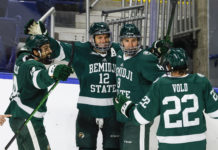Faceoffs: Still important!
What’s that? You missed this week’s stellar feature column about faceoffs? For shame! For if you had perused said piece, you might have enjoyed a modicum of added appreciation for this weekend’s action.
Take Yale’s Friday-night game at Clarkson. The host Golden Knights beat Yale to 45 of 63 dropped pucks (I’m still talking about faceoffs here), which – at 71.4 percent – is an even greater faceoff percentage than the 48-of-68 that Quinnipiac posted against Union, as referenced in the column. In large part thanks to their dominance at the dot, Clarkson out-shot the Bulldogs 35-19, allowing the Knights to ultimately down the visitors 3-2.
In fact, of the six ECAC teams to win the faceoff battle on Friday, all six also out-shot their opponents. The trend held true on Saturday, when four out of six games followed suit.
For the record, teams that won more faceoffs only went 5-6-1 this weekend… but that’s more a question about defense and goaltending, methinks. See Yale’s 4-2 win at St. Lawrence, despite being out-shot 30-29 and losing nearly 2/3 of the draws.
Trend-watch
More self-reference, because I know how much you love to see me be wrong: At the turn of the calendar, I looked at the hockey already played by the ECAC and how it might play out in 2014. A few thoughts in retrospect:
• Brown is 2-1-2 since the holidays, jumping into seventh place in the standing (both in points and win percentage). The Bears look just good enough to sneak into a 5-8 spot and earn a home playoff series, especially since they have seven more home games and five on the road.
• Still not sure about Clarkson. The Knights are 1-1-1 since the New Year against winning teams (Yale, UMass-Lowell) and 2-1 against .500 teams or worse (Brown, Merrimack). The former will have to improve in order for Clarkson to truly impress.
• Colgate’s record in one-goal (or fewer) games is now 8-3-3, which is still far too good for a team that is only 3-6 otherwise.
• Harvard has fallen to 2-7-3 in tight games (decided by one goal or less), but is 3-3 otherwise. They are the reverse-Colgate, as it were.
• In its six games in 2014, Quinnipiac has surrendered 30+ shots as many times (twice) as it did in its first 21 contests. So far this year, Maine and Merrimack have hit that mark.
• Rensselaer has been outscored in the first period once in its last four games, and beaten in the third three times already. RPI had troubles with the final act in 2013; the Engineers appear to be suffering the same malady today.
• Goaltending and defensive miscues continue to plague the Saints, who have lost seven straight and 10 of 12 (2-10). SLU has surrendered three goals or more in 17 of its last 19 games, and neither of its starting goalies has a save percentage above .865.
• Union is 3-1 since New Year’s Day, with the sole loss being a tight-checking 2-1 loss at Quinnipiac. Wins at Princeton and New Hampshire (twice) are great, but factor in just four goals against in those four games and you’ve got yourself a winning ticket. Faceoffs – and ergo puck possession – are becoming a conspicuous problem for the Dutchmen, but the team is emerging triumphant despite that flaw. This is appearing to be a legitimate national contender once more.
Hobey hopes fading away
What with Boston College star Johnny Gaudreau’s NASA-engineered trajectory – an 18-game point streak, eight goals and 19 points in his last seven games – the ECAC’s top players would be hard-pressed to appear as anything other than seat-fillers at the Hobey Baker ceremony. The significant drop-off in production hasn’t helped RPI’s Ryan Haggerty or SLU’s Greg Carey, either.
Carey started the year well, notching six goals and 19 points in the Saints’ first 10 games. Since then however, he has an 8-13–21 line in a dozen more contests. Not too shabby – not by a long shot – but it’s not Hobey-worthy. Haggerty never put up the kind of assists necessary to challenge Carey’s spot atop the ECAC scoring chart, but when the junior sniper jumped out to 18 goals in 15 games, he definitely turned some heads. Unfortunately, both his and his team’s fortune have been in swift decline: Haggerty has added just three assists to his scoring line since Game No. 16, a six-game stretch.
Perhaps not coincidentally, SLU is 2-10 since Carey’s negative acceleration (moment of physics nerdity: there is no such thing as “deceleration”); RPI is 0-5-1 since Haggerty hit the wall.
